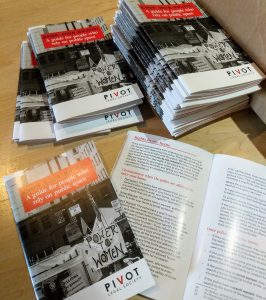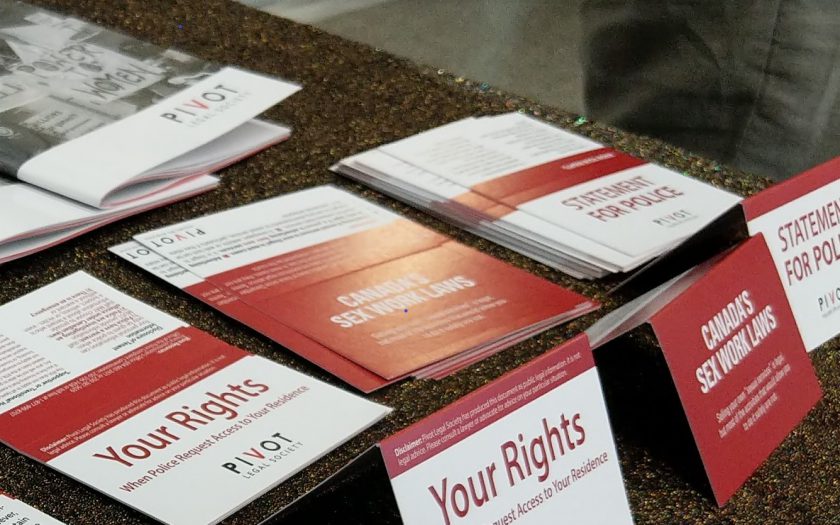Pivot’s Rights Cards for Marginalized People
by Pivot Legal Society
“If it is not accessible to the poor, it is neither radical nor revolutionary”
Jonathan Herrera Soto
What are Rights Cards?
The original card, “Statement for Police,” was first produced in 2002 and launched on the steps of the headquarters of the Vancouver Police Department. 17 years later, these rights cards remain an important resource. These wallet-sized cards are a handy resource for people who want a straightforward rights-based resource. In recent years, we have also collaborated with community groups to produce rights cards that meet the needs of their membership – including groups like Sex Workers United Against Violence (“SWUAV”) and the BC Association for People On Methadone (“BCAPOM”). The rights cards have been distributed to organizations across Canada.
You can access these cards via Clicklaw, or find them on our website:
- Canada’s Sex Work Laws
- Know Your Rights When Speaking to Police
- Know Your Rights With Private Security
- Tenants’ Rights Cards: Know Your Rights When Facing Eviction
- The Good Samaritan Drug Overdose Act: What You Need to Know
How can Rights Cards help me?
If you are someone who regularly deals with law enforcement, these cards are meant to be a handy reference guide. The Statement for Police cards include an overview of your rights, what you can say to police when you are being stopped or questioned, and where to file a complaint. If you are stopped by the police, you can also provide them with the card rather than speaking to them.
Access to justice

Know Your Rights resources are an important part of public legal education efforts. In addition to these materials, however, BC must prioritize steps police accountability processes. During workshops or community forums, Pivot staff regularly hear about how people are afraid of speaking up about their rights because they are not sure if it will escalate their encounter with the police or lead to retaliation in the future.
In Project Inclusion: Confronting anti-Homeless and anti-Substance User Stigma in BC we recommend that the Attorney General take immediate action to increase access to justice for people who believe they have been the victims of excessive force, discrimination, or harassment by police by dedicating legal aid funding for:
- a clinic to support people to make police complaints through summary advice, short service, or full representation based on the needs of the individual and the nature of the complaint;
- public legal education workshops and materials to help people navigate the process of bringing a lawsuit against a police officer or police force; and
- legal representation for families and/or victims in instances of police-involved serious injury or death to facilitate full participation in a Coroner’s Inquests and civil actions.
What’s next?
Police accountability remains a core part of Pivot’s mandate and we continue to advocate for the rights and dignity of criminalized communities who navigate police as part of their daily survival. This past year we authored a memorandum on the unregulated practice of street checks also known as “carding,” provided recommendations to the Special Committee to Review the Police Complaint Process, and called for a harm-reduction informed approach to policing in BC.
Other resources
- Pivot Legal Society – Community Resources, Research Reports, and Submissions & Backgrounders
- Clicklaw – Complaints about police, security guards & public authorities
- Municipal Police Complaints – Office of the Police Complaints Commissioner
- RCMP Complaints – Civilian Review and Complaints Commission for the RCMP
- Human Rights Complaints – BC Human Rights Tribunal
- Know Your Rights: A Primer for Advocates & Service Providers – Webinar Recording
About Pivot Legal Society
Pivot Legal Society, located in Vancouver’s Downtown Eastside, works in partnership with marginalized people and grassroots organizations to challenge legislation, policies, and practices that undermine human rights, intensify poverty, and perpetuate stigma.
As an organization, we recognize the importance of handy, accessible, and informative public legal education materials. We work with many people who rely on public space and through this work we have become aware of barriers they face when accessing legal information, education, or services.
To stay connected to our work, please follow us on our social media below or sign up for our e-mail list.













